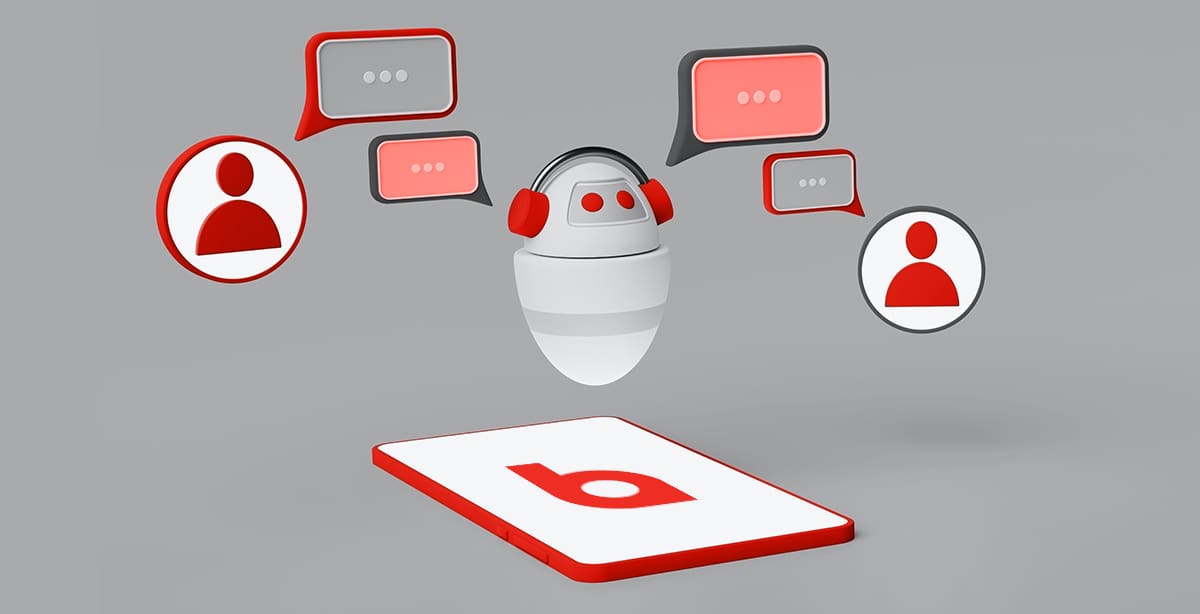In the 21st century business world, consumers have grown to expect personalized service … any day of the year, and around the clock. And with the development of the internet and instant messaging — along with the help of conversational marketing — today’s most forward-thinking brands can deliver just that, all while gaining new customers and building stronger consumer connections.
What is conversational marketing?
Conversational marketing is a modern-day approach to marketing, service and sales that’s typically supported by advanced (and often internet-based) digital technologies. A form of relational and digital marketing, it often leverages AI (artificial intelligence) tools such as chatbots with machine learning and natural language processing in an effort to serve consumers with highly targeted and timely messaging.
Through the use of automated, real-time conversations on a company’s website, on social media or via text message, conversational marketing enables brands to quickly (and often even immediately) answer customers’ questions about their products and services. It can also enable a brand to engage with prospective customers when they’re actually researching products and/or services related to the company’s own offerings, and often even when the consumers are actively looking to make a purchase.
The business-boosting benefits of conversational marketing
As alluded to earlier, today’s consumers like to get precise information quickly. As such, the demand among 21st century consumers for brands to provide interactive services and spontaneous conversations has become more and more prevalent. In fact, delivering in-the-moment answers to consumer questions has become a near-requirement for businesses looking to grow their customer relationships.
Offering both interactivity and real-time responses, conversational marketing can cover all of these needs to deliver clear benefits for consumers. And of course, in doing so, the tactic can offer a range of substantial advantages for businesses and brands, too.
Among the benefits a brand can secure by implementing conversational marketing:
- Added efficiency via reduced customer service time spent answering common consumer questions
- Significant savings of time, effort and money as a result of the added efficiency mentioned above
- Increased consumer engagement via interactions with chatbots, live chats, instant messaging, etc.
- Boosted conversations with consumers as a result of always-at-the-ready answers to their questions
- Advancement of consumers along the sales funnel via recommendations of products/services that solve their problems, along with easy identification of qualified leads
Ultimately, conversational marketing can strengthen a brand’s relationships with its customers. It allows businesses to immediately interact with a consumer and quickly understand his or her immediate need. And by employing the tactic on various communication channels, companies can have an impact on and attract prospective customers from wide-ranging age groups and backgrounds. Further, conversational marketing builds trust and can be a cornerstone to building a strong ambassador community.
4 leading conversational-marketing tools
No matter what avenue a brand takes to its implementation of conversational marketing, it can enable customers to ask questions and get answers quickly — which can be especially beneficial for brands with complicated products or a challenging purchase process. Here are four especially effective tools to consider leveraging for your brand’s conversational marketing efforts:
1. Chatbots
Typically powered by AI, a chatbot is a software application designed to help a website’s visitors get the information they need without the need for assistance by a live human agent. Using a conversation that’s generally conducted via a pop-up on-screen messaging window, chatbots often point consumers to existing online resources via back-and-forth messages meant to mimic natural human conversation. They can be used to provide 24/7 customer service, route consumer queries or gather information — all without requiring human intervention, delivering added efficiencies for businesses and boosting the availability of live customer-service workers. And for consumers, they enable fast, around-the-clock assistance with common product- and service-related queries.
2. Live chat
Great for handling less-common and/or more-complicated queries that a chatbot can’t cover, or for guiding consumers through the self-service process when issues arise with a product or service, live chat sees a live human agent answer customers’ questions in a conversational manner. Typically handled via a pop-up on-screen messaging window on a brand’s website and often initiated via the elevation of a chatbot session, live chat helps customers get answers to more-complicated questions quickly and without having to search through a wealth of largely unrelated information on a brand’s website. For brands, live chat can help get consumer issues resolved more quickly than phone or email queries, helping to free up agents’ time for handling other customer inquiries.
Brandon success story:
Seeking to elevate its online customer service efforts, Brandon client FTC implemented live-chat functionality on its website. After doing so, the telecommunications company headquartered in Kingstree, South Carolina, averaged 94 chat sessions per month in 2022, with an average issue-handling time of around 13 minutes per session. This served to both quickly resolve customers’ issues and lower the time investment FTC agents had to make in handling them.
3. Social media messaging
Enabled via the chat/direct messaging apps associated with many social media platforms — such as Facebook’s Messenger, Instagram’s direct messages, TikTok’s direct messages and Twitter’s direct messages — social media messaging provides another avenue for brands to carry on direct, private and personalized conversations with consumers. While rarely conducted in real time the way the aforementioned chatbot and live chat conversations are, social media messaging can facilitate quick-turn answers to consumers’ questions as long as the brand or business regularly checks for messages on its social channels and responds to them quickly.
Brandon pro insight:
Chatbots can also be implemented on social media messaging platforms to ensure that consumer questions sent via social media messaging receive fast replies, and that queries necessitating a human response are quickly routed to the best representative for handling them.
4. Text messaging
With the vast majority of today’s consumers carrying their smartphones with them nearly everywhere, SMS messaging offers a fast and direct route for brands to carry on real-time conversations with consumers who opt in to such communications. That can all take place in a less-intrusive manner than communicating via a phone call. Brands and businesses commonly use text messages to send appointment and service reminders, as well as product updates, coupons and event notifications. SMS messaging is also critical in the travel industry, where customers often need to be notified right away of any scheduling or booking changes.
Brandon pro insight:
For text messaging campaigns to be truly conversational, a business must implement a way for any customer-texted questions to be answered quickly, and for consumer responses to any brand-initiated text messaging to be routed to someone who can deliver a timely response.
Brandon success story:
For Brandon client Fish Hippie, a lifestyle apparel company headquartered in Mount Airy, North Carolina, the implementation of SMS marketing has proven to be wildly successful. Since their 2022 launch, Fish Hippie’s text-messaging campaigns have grown to surpass its email campaigns in revenue produced — and now serve as the company’s No. 1 e-commerce revenue producer.
Here at Brandon, our team of data-driven marketing professionals and certified brand strategists is always eager to elevate your brand’s customer and prospect relationships — whether via conversational marketing tactics or a broad range of other marketing approaches. To get started with professional marketing help ranging from adding conversational marketing tools to your arsenal to creating a comprehensive new strategy designed to boost the performance of all of your marketing efforts, contact us today.

